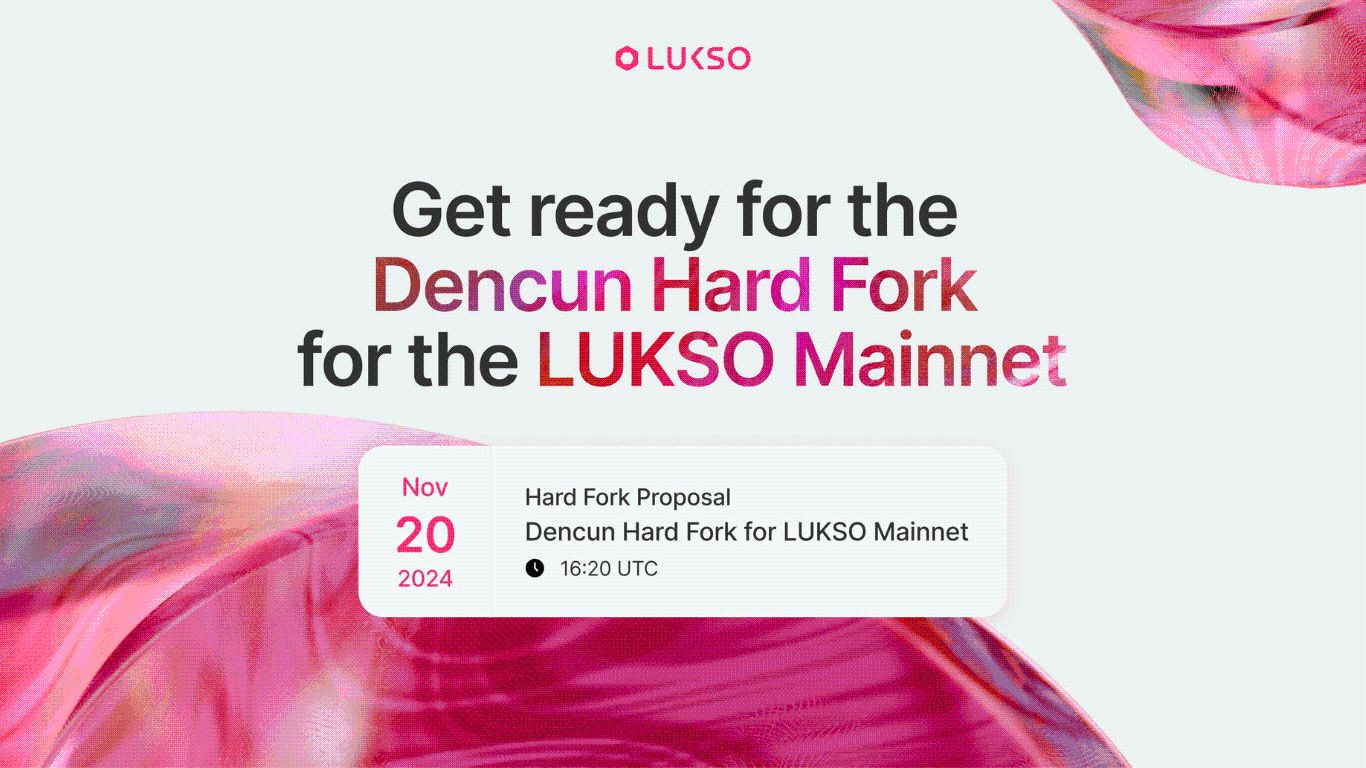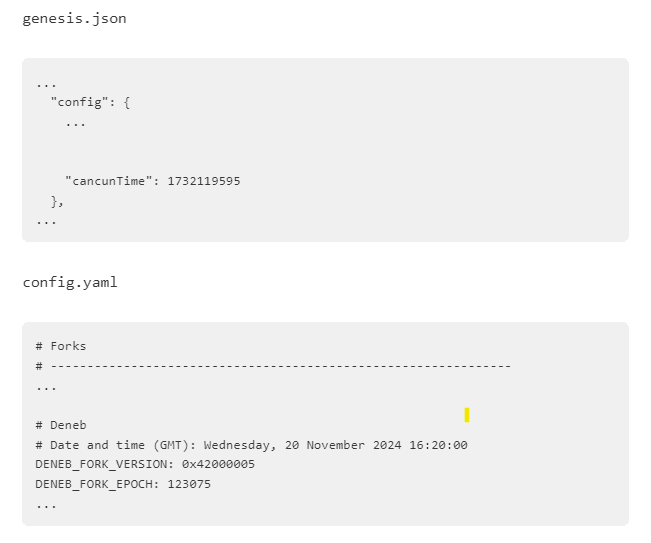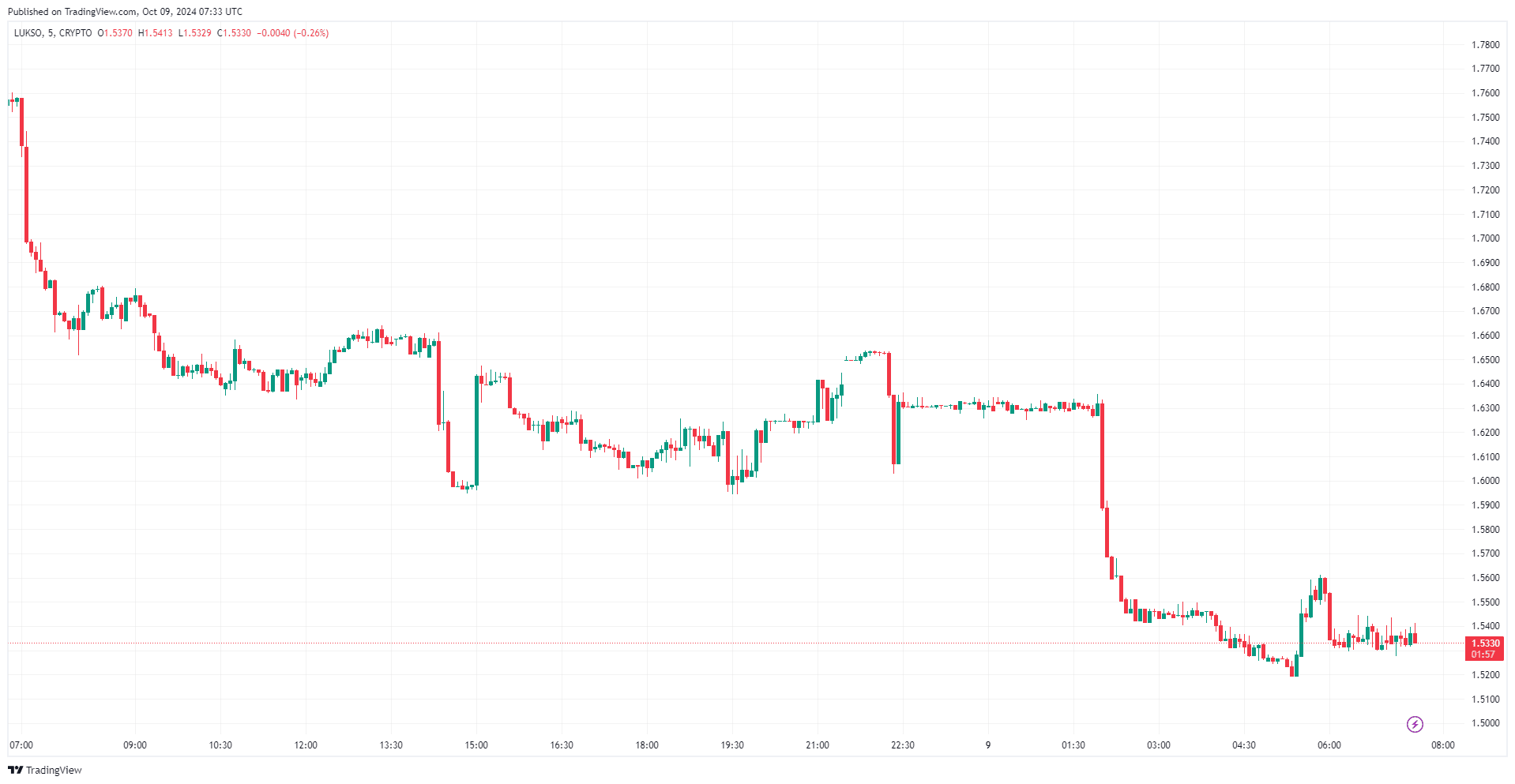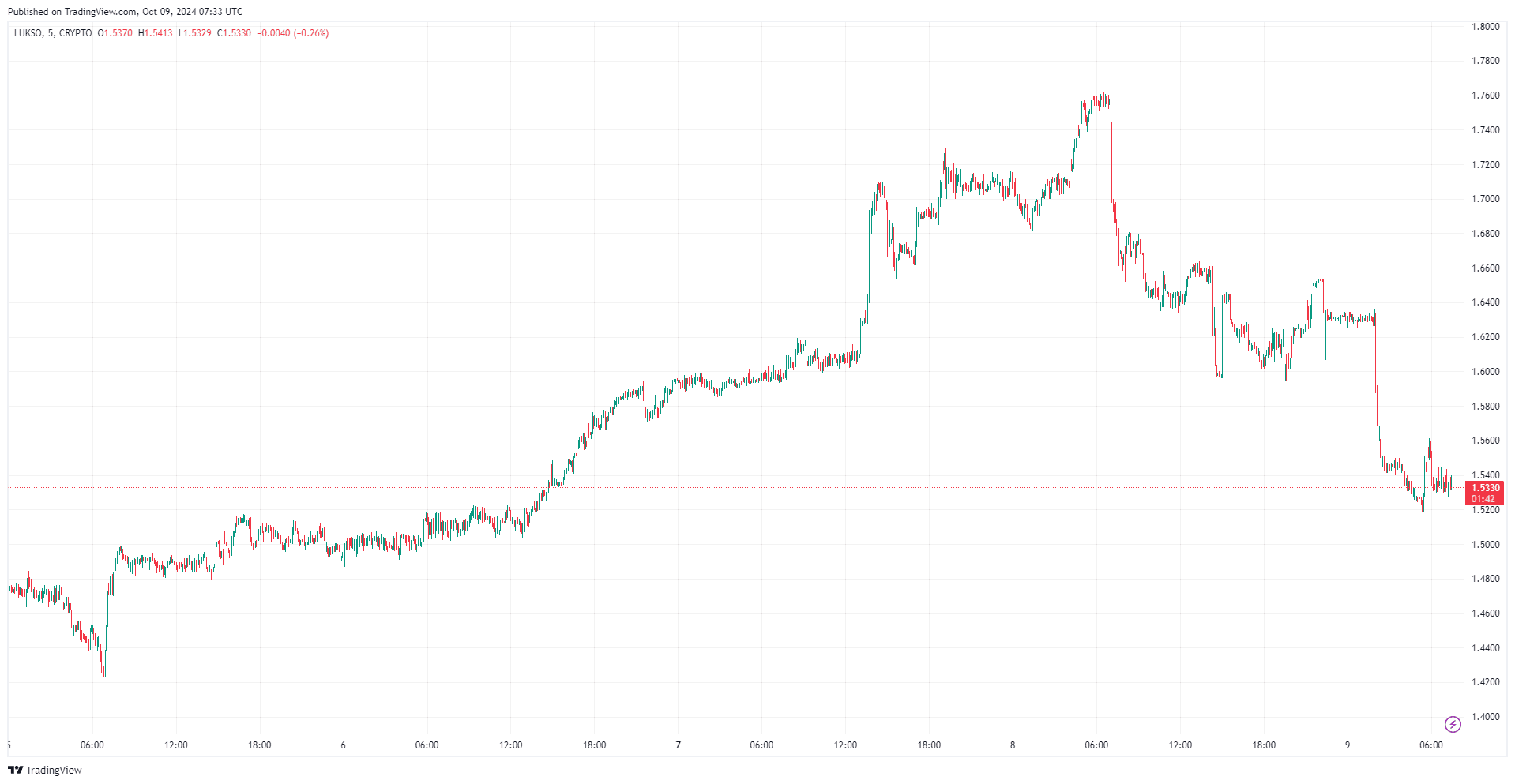How to Prepare for the LUKSO Dencun Hard Fork: Mainnet Update Guide & LYX Price Analysis
The LUKSO Mainnet is gearing up for the Dencun Hard Fork scheduled for November 20, 2024, at 4:20 pm GMT. Node operators and validators must prepare for this significant update to ensure a seamless transition. This guide covers everything you need to know and all the essential steps to implement the Dencun Hard Fork on LUKSO Mainnet nodes , update software versions, and apply network configurations. Follow along to ensure your LUKSO Mainnet node is ready for this critical update and what to expect for the LYX token ahead and following this major update.
 LUKSO Mainnet Update - Dencun Hard Fork Announcement
LUKSO Mainnet Update - Dencun Hard Fork Announcement
| Mainnet | Testnet | Hard Fork |
| A mainnet (main network) is the fully developed and operational version of a blockchain where real transactions and data are processed. When a project reaches mainnet, it’s live, and all activity on it has a real impact (e.g., sending cryptocurrency, deploying smart contracts). Mainnets represent the official network where all actual transactions are recorded on the blockchain. | A testnet (test network) is a parallel blockchain environment used for development, testing, and experimentation. It allows developers to test new features, upgrades, and smart contracts without risking actual funds or affecting the mainnet. Testnets are crucial for identifying and fixing issues before launching updates or new projects on the mainnet. | A hard fork is a major upgrade or change in a blockchain’s protocol that makes previously valid blocks or transactions invalid (or vice versa). This creates a divergence in the blockchain, resulting in two separate chains: one that follows the old rules and one that follows the new ones. Hard forks can be contentious (like Bitcoin and Bitcoin Cash) or planned upgrades (like Ethereum’s various hard forks). |
1- What is LUKSO?
LUKSO is a blockchain network designed for the creative and lifestyle industries by the co-founder of Ethereum, Fabian Vogelsteller . It aims to bring blockchain technology into areas like fashion, art, and design, allowing for digital assets, tokenization, and decentralized applications (dApps) specifically geared toward creators. LUKSO leverages Ethereum Virtual Machine (EVM) compatibility, which makes it compatible with Ethereum-based dApps. Its native token is LYX , used for transactions and to participate in governance. The platform’s primary goal is to help brands and creators engage with digital assets, NFTs, and identity verification in a decentralized way.
2- What is The DENCUN Hard Fork?
Dencun is an upcoming hard fork for the Ethereum blockchain, combining features from two separate upgrades: Deneb and Cancun. This hard fork focuses on implementing Ethereum Improvement Proposals (EIPs) that aim to enhance Ethereum's efficiency, scalability, and functionality. Some key upgrades expected with Dencun include:
- EIP-4844 (Proto-Danksharding): A significant update designed to lower transaction fees on Ethereum Layer 2 solutions by introducing a new type of data for rollups.
- EIP-1153: Aims to improve efficiency by adding temporary storage to smart contracts, which can save gas fees.
- EIP-4788: Helps the Ethereum mainnet by making the beacon chain more useful for Layer 2 systems, making Ethereum better equipped for a multi-chain future.
The Dencun hard fork represents Ethereum's efforts to optimize its performance, reduce costs, and create a more scalable and adaptable network for users and developers.
3- What is the LUKSO Dencun Hard Fork?
The Dencun Hard Fork on the LUKSO Mainnet marks a major update following the successful deployment on the LUKSO Testnet. This update includes new features and optimizations designed to enhance the network's functionality and stability. To support the Dencun Hard Fork, all LUKSO Mainnet node operators and validators must update their clients and apply the required network configuration changes by November 15, 2024.
4- Required Updates for LUKSO Mainnet Operators
If you are a node operator or validator on the LUKSO Mainnet, it's crucial to upgrade your clients to one of the latest supported versions:
Execution Clients:
- Geth v1.14.7
- Erigon v2.60.4
- Besu v24.7.0
- Nethermind v1.27.0
Consensus Clients:
- Prysm v5.0.4
- Lighthouse v5.2.1
- Teku v24.6.1
Once you have the latest client versions installed, update your configuration files (genesis.json and config.yaml) in the ' config/mainnet/shared/directory ' (config/mainnet/teku | config/mainnet/nethermind when running Teku or Nethermind client) folder:
 GitHub pull request
GitHub pull request
This step is essential for the LUKSO Mainnet Dencun Hard Fork and ensures compatibility with the updated network parameters. You can then restart your nodes and your system should be ready for the hard fork!
5- How to Update Your LUKSO Mainnet Nodes
Using the LUKSO CLI
For those managing nodes with the LUKSO CLI, follow these steps to complete your updates:
1- Install the new LUKSO CLI release v0.21.1: curl https://install.lukso.network | sh
2- Update your client versions: lukso update
3- Download the latest network configuration: lukso update configs
4- Restart your node and validate that it’s running with the updated configuration: lukso start --validator --transaction-fee-recipient "<your address>"
Using LUKSO Dappnode
For Dappnode users, updates will be available through the auto-update feature or manual installation. Ensure auto-updates are active, or manually update your node once the update notification appears on your dashboard. For the Dencun Hard Fork, update to the following versions:
- prysm-lukso.dnp.dappnode.eth v0.1.3
- lukso-geth.dnp.dappnode.eth v0.1.3
- teku-lukso.dnp.dappnode.eth v0.1.3
6- Update Instructions for Docker and Custom Setups
If you’re running Docker or a Custom setup, follow these guidelines:
Docker Setup
- Update your .env file with the latest versions listed in the .env.mainnet file.
- Ensure your config.yaml and genesis.json files match the latest configurations in the LUKSO network-configs repository.
- Use the Docker Factory to generate and replace your old docker-compose file with a new one.
Custom Setup
For those running custom configurations, download the latest executables and configurations for your client. Apply the LUKSO Mainnet network settings to match the Dencun Hard Fork specifications.
Get Support!
If you encounter any issues during the update process, visit the LUKSO Discord #validators-chat Channel to connect with the community and receive assistance.
7- LYX Price Analysis: What Will the LUKSO Dencun Hard Fork Effect Be on LYX Price?
 By TradingView - LYXUSD_2024-10-09
By TradingView - LYXUSD_2024-10-09
The current LYX price sits at $1.5320, reflecting a significant downward trend, with a 24-hour decrease of 5.80% and a one-month decline of 26.32%. The technical indicators suggest a bearish momentum: the Relative Strength Index (RSI) at 36.96 indicates that LYX is approaching oversold territory, though it hasn’t yet crossed the threshold. With the 50, 100, and 200 day Moving Averages well above the current price, LYX price is still under selling pressure, pointing to sustained bearish sentiment over the past few months.
 By TradingView - LYXUSD_2024-10-09 (5D)
By TradingView - LYXUSD_2024-10-09 (5D)
Historically, token prices have often rebounded after successful network upgrades or forks, especially if the update brings substantial improvements. Given the upcoming Dencun Hard Fork on LUKSO Mainnet, LYX price could experience a short-term rally if the market perceives the hard fork as a value-enhancing event. Based on similar past scenarios with other tokens, LYX price could potentially see an upward shift post-fork, although recovery to previous levels like $2.00 may be gradual, depending on market sentiment and overall performance of the LUKSO ecosystem post-upgrade.
Disclaimer: The content of this article solely reflects the author's opinion and does not represent the platform in any capacity. This article is not intended to serve as a reference for making investment decisions.
You may also like
Blockchain Association Urges Congress to Repeal IRS DeFi Broker Rule

Shiba Inu Price Faces Bearish Trends Amid 79% Decline in Whale Moves

Here’s How Much Bitcoin U.S. States Could Accumulate

NFTScan Joins Conduit Marketplace to Expand NFT Data Access Across 20+ Blockchains
